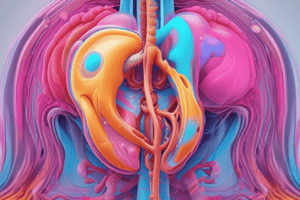Podcast
Questions and Answers
What type of study provides valuable information on detrusor function?
What type of study provides valuable information on detrusor function?
- Renal tract ultrasound
- Computed tomography (CT)
- Pressure–flow study (correct)
- Cystoscopy
Which imaging study could assist in the identification of fistulas, strictures, bladder diverticula, or tumors?
Which imaging study could assist in the identification of fistulas, strictures, bladder diverticula, or tumors?
- Urodynamic studies
- Cysto-urethrography (correct)
- Computed tomography (CT)
- Renal tract ultrasound
In which cases are urodynamic studies recommended?
In which cases are urodynamic studies recommended?
- Patients with suspected voiding difficulties or neuropathy (correct)
- Patients with a known history of haematuria, neurological or prior genitourinary surgery
- Patients with a provisional diagnosis of BPH or OAB
- Patients with suspected upper urinary tract dilatation
When is referral to a urologist recommended for men?
When is referral to a urologist recommended for men?
Which specialized test should be individualized for the evaluation of the presence of urethral strictures, an obstructive prostate, bladder stones, or tumors?
Which specialized test should be individualized for the evaluation of the presence of urethral strictures, an obstructive prostate, bladder stones, or tumors?
Study Notes
Urological Studies
- Urodynamic studies provide valuable information on detrusor function.
- Imaging studies, such as fluoroscopy, CT, or MRI, assist in identifying fistulas, strictures, bladder diverticula, or tumors.
- Urodynamic studies are recommended for patients with:
- Persistent lower urinary tract symptoms (LUTS)
- Suspicion of bladder outlet obstruction
- Neurological disorders affecting the lower urinary tract
- Previous urinary tract surgery or trauma
- Referral to a urologist is recommended for men with:
- LUTS persisting after treatment
- Suspicion of prostate cancer
- Abnormal digital rectal examination (DRE) findings
- Specialized tests, such as uroflowmetry and pressure-flow studies, should be individualized to evaluate the presence of:
- Urethral strictures
- Obstructive prostate
- Bladder stones
- Tumors
Studying That Suits You
Use AI to generate personalized quizzes and flashcards to suit your learning preferences.
Description
Test your knowledge of imaging and contrast studies used in urology for diagnosing urinary tract conditions such as dilatation, bladder pathology, fistulas, strictures, and tumors. Learn about the use of renal tract ultrasound, cysto-urethrography, computed tomography (CT), and cystoscopy in the evaluation process.




